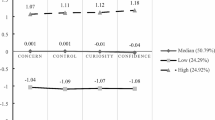Abstract
The purpose of this study is to explore Islamic Human Value which is believed by the young millennial generation to determine career adaptability and career success. Career success is very important for today’s Muslim millennial generation because they have high expectations regarding work-life balance. To achieve career success, it is necessary to have career adaptability so that the Muslim millennial generation is able to prepare themselves to face unexpected transitions or changes. In addition, the Muslim millennial generation also needs to have Islamic values, namely Islamic human values. These values are important so that the millennial generation has good planning in building a career. This research is qualitative research by conducting structured interviews on 8 respondents. The results show that there are 6 Islamic human values that can be applied as the basis for achieving career adaptability and career success.
Access this chapter
Tax calculation will be finalised at checkout
Purchases are for personal use only
Similar content being viewed by others
References
Smola, K., Sutton, C.D.: Generational differences: revisiting generational work values for the generational differences: revisiting generational work values for the new millennium. J. Organs. Behav. 23(4), 363–382 (2002). https://doi.org/10.1002/job.147
Wong, M., Gardiner, E., Lang, W., Coulon, L.: Generational differences in personality and motivation: do they generational differences in personality and motivation do they exist and what are the implications for the workplace ? J. Manag. Psychol. 23(8), 878–890 (2008). https://doi.org/10.1108/02683940810904376
Othman, R., Kamal, N.M., Alias, N.E.: Positive psychological traits and career adaptability among millennials. Int. J. Acad. res. Buses. soc. Sci. 8(9), 1420–1433 (2018). https://doi.org/10.6007/IJARBSS/v8-i9/4706
Wang, Z., Fu, Y.: Social support, social comparison, and career adaptability: a moderated mediation model. Soc. Behav. Pers. 43(4), 649–660 (2015). https://doi.org/10.2224/sbp.2015.43.4.649
Xu, C., et al.: The role of career adaptability and resilience in mental health problems in Chinese adolescent children and youth services review the role of career adaptability and resilience in mental health problems in Chinese adolescents. Child. Youth Servant. Rev. 112(30), 104893 (2020). https://doi.org/10.1016/j.childyouth.2020.104893
Koen, J., Klehe, U., Van Vianen, A.E.M., Zikic, J., Nauta, A.: Job-search strategies and reemployment quality the impact of career adaptability. J. Vocat. Behav. 77(1), 126–139 (2010). https://doi.org/10.1016/j.jvb.2010.02.004
Judge, T.A., Higgins, C.A., Thoresen, C.J., Barrick, M.R.: The big five personality traits, general mental ability, and career success across the life span. Pers. Psychol. 52(3), 621–652 1999
Gattiker, U.E., Larwood, L.: Predictors for managers career mobility, success, and satisfaction. Hum. Relative. 41(8), 569–591 (1988). https://doi.org/10.1177/001872678804100801
Judge, T.A., Cable, D.M., Boudreau, J.W., Bretz, R.D.: An empirical investigation of the predictors of executive career success. 48(3), 485–519 (1995). https://doi.org/10.1111/j.1744-6570.1995.tb01767.x
Nabi, G.R.: An investigation into the differential profile of predictors of objective and subjective career success. Career Dev. Int. 4(4), 212–224 (1999)
Rehman, A., Shabbir, M.S.: Adoption the relationship between religiosity and new product adoption. J. Islam. Mark. 1(1), 63–69 (2010). https://doi.org/10.1108/17590831011026231
Worthington, E.L., et al.: The religious commitment inventory — 10: development, refinement, and validation of a brief scale for research and counseling. J. Couns. Psychol. 50(1), 83–96 (2003). https://doi.org/10.1037/0022-0167.50.1.84
Aziz, S., Husin, M., Hussin, N.: role of perceived trust factors that influence individuals’ intentions to purchase family takaful mediating role of perceived trust, Asia Pacific. J. Mark. logistics. (2019). https://doi.org/10.1108/APJML-12-2017-0311
Marian, R., Salsali, M., Vanaki, Z., Ahmadi, F., Hajizadeh, E.: Professional ethics as an important factor in clinical competency. Nurs. Ethics 14(2), 203–214 (2007)
Hystad, S.W., Bye, H.H.: Safety behaviors at sea: the role of personal values and personality hardiness. Saf. Sci. 57, 19–26 (2013). https://doi.org/10.1016/j.ssci.2013.01.018
Creswell, J.W.: Research Design Qualitative, Quantitative and Mixed Methods Approach. Student Library (2014)
Author information
Authors and Affiliations
Corresponding author
Editor information
Editors and Affiliations
Rights and permissions
Copyright information
© 2022 The Author(s), under exclusive license to Springer Nature Switzerland AG
About this paper
Cite this paper
Adhiatma, A., Althof, S.V.F., Triantiani, M. (2022). Islamic Human Values for Career Adaptability and Career Success of Millennial Generation. In: Barolli, L. (eds) Complex, Intelligent and Software Intensive Systems. CISIS 2022. Lecture Notes in Networks and Systems, vol 497. Springer, Cham. https://doi.org/10.1007/978-3-031-08812-4_33
Download citation
DOI: https://doi.org/10.1007/978-3-031-08812-4_33
Published:
Publisher Name: Springer, Cham
Print ISBN: 978-3-031-08811-7
Online ISBN: 978-3-031-08812-4
eBook Packages: Intelligent Technologies and RoboticsIntelligent Technologies and Robotics (R0)




